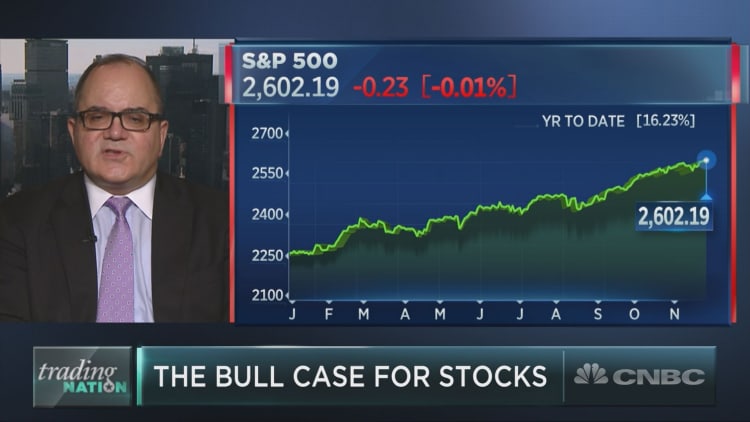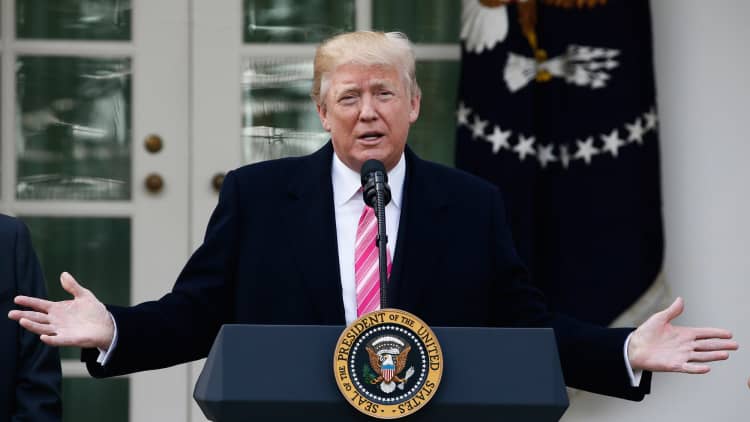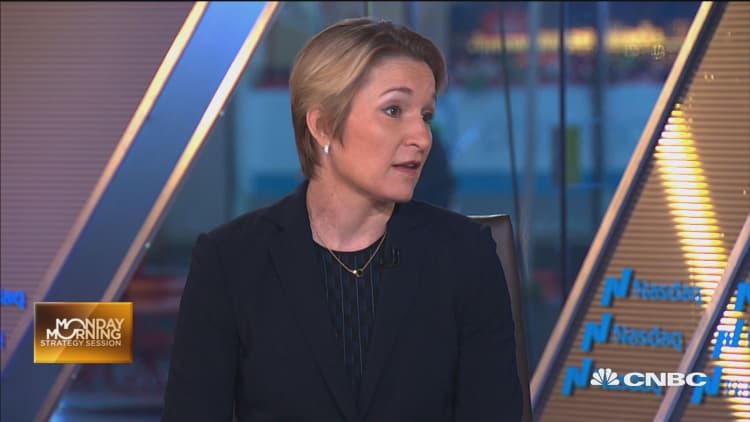While stocks have rallied around it, some Wall Street pros say the tax bill could be almost too much of a good thing for the economy.
Joseph LaVorgna, Natixis chief economist for the Americas, said the economy, growing at 3 percent in the second and third quarters, should grow just as quickly this quarter, raising questions about whether the tax plans proposed by Congress are necessary in either of their current forms.
"In such a scenario, one has to wonder whether large deficit-induced tax cuts make economic sense," he wrote in a note. "While tax reform is necessary and long overdue, the current tax bill iteration falls short on many levels." LaVorgna said there is less growth and more debt than he envisioned, and the individual tax plan is more complicated.

Both the Senate and House tax plan would cut corporate taxes by 20 percent, but they vary on the details. Congress' Joint Committee on Taxation says each would increase deficits by $1.4 trillion.
The White House says the plans, which have many popular features, will boost growth, help small business and the middle class, and make American companies more competitive. The goal is to have a compromise package approved by the House and Senate and made law before the end of the year.
Citadel CEO Ken Griffin told CNBC Monday that while tax reform for individuals is helpful for millions of Americans, he questioned the timing of the package.
"We're late in the business cycle, and to the extent this is a move that would be stimulative in nature you would usually reserve tax reform of this nature for right in the midst of a recession. So to the extent this represents fiscal stimulus, this is a latent business cycle move. It would be contrary to what you would traditionally do from an economic perspective," he said.
But he added that tax reform is necessary. "Do we need to cut taxes as much as we are? Probably not. Do we need to reform taxes, simplify taxes, and keep America competitive? Absolutely," he said. But he said the proposed 20 percent corporate tax rate from the current 35 percent may be too steep a cut, compared with the average mid-20s percent corporate tax rate for OECD countries.
BlackRock's Rick Rieder agrees. "One man's point of view: I think the corporate tax rate should be 25 or 27 percent," said Rieder, global chief investment officer of fixed income, in a recent interview. "Along with direct expensing, a 20 percent corporate tax rate is too low because of the potential cost of doing it."
The legislation includes a provision allowing companies to immediately expense 100 percent of capital expenditures. Strategas Research said that alone would boost the economy by 1 percent next year.

"The Trump Administration has thrown down the red line that it wants the corporate tax rate at 20 percent. But the solution to the issues facing the tax bill is to implement the corporate tax cut immediately and at a 23 percent tax rate," wrote Dan Clifton, Strategas head of policy research, in a note. Clifton said Congress could tweak some aspects of the bill, enact a lower tax rate right away and save $165 billion.
Rieder also questioned the timing. "It will pull growth forward. It's hard to see a recession in 2018," he said, but it's possible for 2019 or 2020. "It will pull forward growth you would have seen in 2019 and 2020."
"The bill will definitely springboard growth and I think people underestimate the multipliers associated with that," he said.
One fear in the market is that the tax plan could heat up the economy and inflation, bringing the Fed into play much more frequently, with more interest rate hikes than now expected. Rising rates could ultimately slow down activity.
Another concern is the unintended consequences of the bill. LaVorgna said real estate values could fall in high-tax states, such as New York and California, and homeowners could be hurt if a proposal to limit state and local tax deductions makes it through to law.
"What they're doing with housing, I don't think this is well thought out. If you're asking me should we make this tax code simpler, and phase out some of these deductions? Absolutely, but the operative word is phased out," said LaVorgna. He also said a bipartisan plan would have been better, since it would be less likely to be revised or overturned at a future date.
WATCH: Promise of tax reform better than delivery



